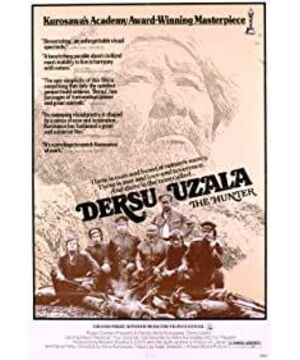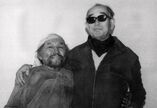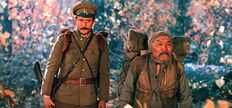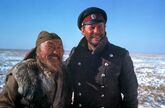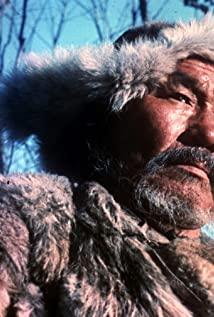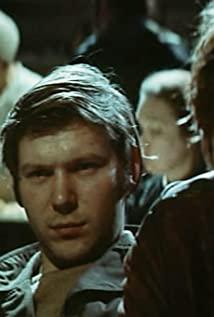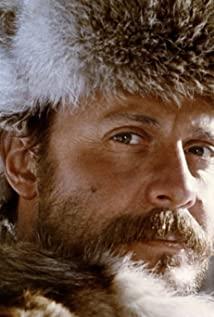Kurosawa had studied the works of Russian military explorer Arseniev's "In the Border Region of Ussuri" and "Delsu Uzala" 30 years before the filming of the film. The desire to be on the screen. After 10 years, he intends to put this wish into practice. But I went to Hokkaido to see the location and found that it is impossible to produce a character like Delsu in the Hokkaido environment. Delsu can only be connected with the dense forest of Ussuri. The film can only be filmed in Ussuri, Russia. It was impossible at the time, so I had to give up. Kurosawa has directed nearly 30 films before shooting this film. In these films, people often appear powerless when fighting against evil forces. Kurosawa once committed suicide in pain. Later, he felt that he should say goodbye to this terrible and hopeless mental state of people. With enthusiasm, he wanted to call for kind feelings, humanity, and humanitarianism on people. He once again remembered Alsenyev’s Works, so he went to the Soviet Union in 1971. Kurosawa spent four full years on the production of this film. For a long time thereafter, Del Su has been living in front of him, and only after Del Su's image fades did he start shooting new films.
Kurosawa said: "I made this film to show a person who lives in nature, merges with nature, and becomes a part of nature. I think we are from this person, that is, from Del Su You can learn a lot.” He believes that modern civilization is often built on the basis of destroying nature. One day, nature will be destroyed so that people cannot survive. Human progress should be built on the basis of harmony with nature. superior. This is the main idea of the film.
Before filming, Akira Kurosawa and Soviet dramatist Yu Najibin each wrote a literary script. As a result, the scripts they wrote based on the same work were quite different: Najibin's script focused on thrilling plots, while Kurosawa played down the drama and focused on depicting people and nature. In the end, the two reached a consensus. The film's rhythm seems to be relatively slow, which is required by the film's profound connotation. Kurosawa said that he wanted to give the audience room to think.
There are actually three protagonists in the film: Arseniev, Delsu and Nature. Arsenyev was a military member, came from a city, had a higher education, and understood scientific knowledge; Del Su was born and raised in a dense forest and had never entered a civilized society. These two contrasting people have established a deep friendship and friendship. The foundation is their common love for nature. As a military strategist and scientist, Arsenyev conducted scientific investigations on the dense forests, rivers, and mountains of Ussuri, while Delsu’s understanding of nature was simple, relying entirely on his intuition and experience. He has spent his life in the dense forest. He knows that nature is human's food and clothing parents, and it provides people with warmth and shelter. As long as people understand nature's habits, they can get its endless blessings.
The film is full of good and righteous thoughts, which is fully reflected in Arseniev; he prevented the expeditioners from shooting at the deer, filled the trap for catching deer, and released a doe back to the dense forest. He invited Li Chunping to drink. Tea, also took Del Su to the home for retirement. The film shows the spirit of the protagonist through extremely specific actions. Another example is Delsu repairing the hut and preparing materials for later generations, which moved Arseniev deeply. Del Su is as simple as nature. He didn’t know his age; he didn’t understand why those businessmen cheated him of the money; he was angry when the expedition team threw the leftover meat into the fire, because there were “people” who could still eat it. In his opinion, the badger , Wolves, crows, mice, everything around is human; the film successfully shows Del Subo's big mind and simple feelings through trivia. Del Su looked at the railway, and when he encountered the cold rails, he immediately retracted his hands. This action vividly shows that he is far away from civilized society and has never seen a train; he is very indignant that he has to spend money on everything in the city, thinking that water and firewood All belong to nature, and nature bestows on mankind free of charge. He has his unique understanding of things because he is part of nature.
Arseniev and Delsu met again in 1907 five years after their parting. The scene was handled vividly: the two ran towards each other across the bushes, and the two had reached a distance that could almost be hugged. But there was a thick tree lying horizontally, and they were laughing and running around the tree, looking at each other, but their hands couldn't touch each other. They walked around the tree and finally sat down by the bonfire together. In the background, the four Cossacks were singing softly non-local, remote, grassland songs. In the foreground, Arsenyev and Del Su was talking in a low voice, surrounded by dense forests. The people in the foreground and the background do not hinder each other, and their world is completely different: Delsu, Arseniev and the jungle are harmonious, and the four new Cossack expedition members and the surrounding The natural environment is somewhat inconsistent.
The scenes of rapids, gusts, ice and snow in the film are very real, making people feel the endless change of nature and its immense power. When the wind was blowing, the sky on the screen was dim, and the biting cold wind made people unstable. The picture of the red sun on the horizon is also quite spectacular. Kurosawa said that the most difficult thing to shoot in the film is nature, because it does not obey the director's instructions.
The film vividly, concretely and artistically expresses profound philosophical thought: the law of being born in nature and returning to nature is insurmountable. When Del Su discovered that his vision loss and signs of aging had quietly appeared on him when he was hunting, Arseniev understood: Del Su's dense forest life was about to end, and all this was natural. The alliance between man and nature is not idyllic, tragedy will inevitably occur. The handling of this scene at the end, as in the past, Kurosawa will surely make Arsenyev angry and painful because of this unjust tragedy, expressing his extreme sadness to Delsu’s corpse, but in this film , But he took the scene very calmly: he let the camera roll up slowly, hillocks appeared on the screen, and then up again, the tops of pine trees appeared, and then the vast dense forests, all of this , Makes people realize that the laws of nature are irresistible, and Delsu, who came from nature and dense forest, has returned to the dense forest and nature. A middle shot appeared on the screen. Arseniev inserted a tree stick in Del Su's tomb, which was the kind of stick with branches commonly used by Del Su. Before the next spring, it will be blown away by the wind, and the wind in the future will also blow away the dirt on the grave, which will bring a new life... As an individual, it may be a tragedy to leave this world when you grow old, but As a human being, life is still going on; everything has a metabolism, but nature lasts forever!
View more about Dersu Uzala reviews


